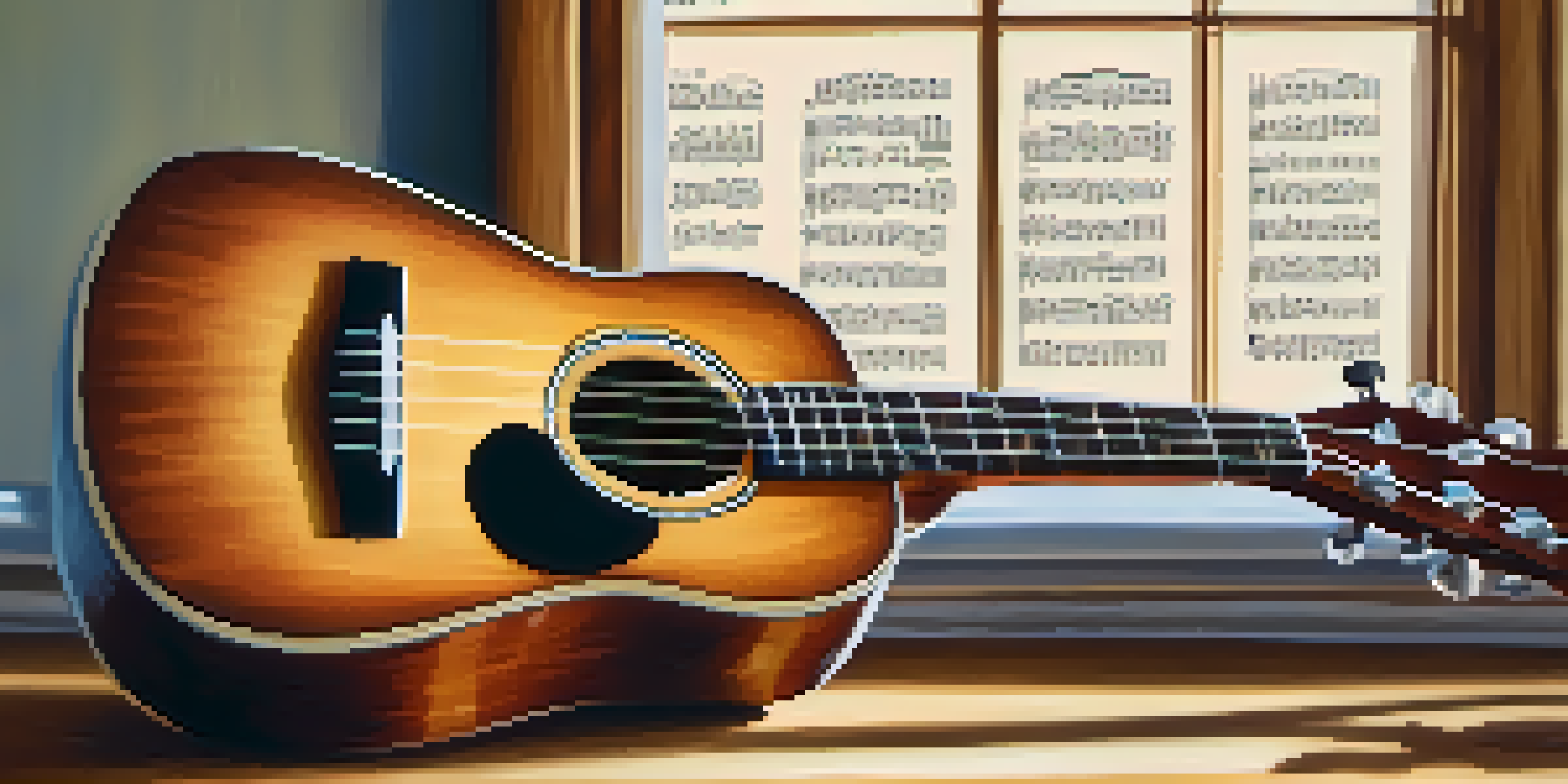Songwriting for Beginners: Getting Started with Your Ukulele

Understanding the Basics of Your Ukulele
Before diving into songwriting, it's essential to familiarize yourself with your ukulele. This small yet versatile instrument is known for its light, cheerful sound, making it perfect for beginners. Spend some time learning about the different parts of the ukulele and how they contribute to its unique tone.
Music can change the world because it can change people.
Take note of the four strings and their names: G, C, E, and A. Understanding their positioning and how to tune them will make your journey smoother. Just like learning the alphabet, knowing your strings is the first step in creating beautiful melodies.
Once you're comfortable with your ukulele, you can explore basic chords. These simple combinations of notes will serve as the foundation for your songs, allowing you to experiment and express yourself creatively.
Finding Inspiration for Your Songwriting
Inspiration can strike at any moment, so keeping your eyes and ears open is crucial. Whether it's a personal experience, a story you've heard, or even a beautiful sunset, the world is full of ideas waiting to be transformed into lyrics. Consider carrying a notebook to jot down thoughts or feelings that resonate with you.

Listening to songs from various genres can also spark inspiration. Pay attention to lyrics, melodies, and chord progressions that resonate with you. Analyzing your favorite songs helps you understand how other artists convey emotions and tell stories through music.
Know Your Ukulele Basics
Familiarizing yourself with your ukulele's parts and strings is essential for creating beautiful melodies.
Don't be afraid to draw from your own life experiences. Personal stories often resonate more deeply with listeners, making your song authentic and relatable. Remember, every great song begins with a spark of inspiration.
Crafting Your First Song: Structure Matters
When you're ready to write, understanding song structure is key. A typical song often consists of verses, a chorus, and sometimes a bridge. The verse sets the scene, the chorus delivers the main message, and the bridge offers a different perspective before returning to the familiar.
The beautiful thing about learning is that no one can take it away from you.
Start by brainstorming ideas for your lyrics. Think about the story you want to tell and break it down into sections. You might find it helpful to write a catchy chorus first, as it can guide the theme of your verses and keep your audience engaged.
As you work on your structure, remember to keep it simple. Your first song doesn't have to be a masterpiece. Focus on expressing your thoughts and emotions, and let the structure evolve naturally as you write.
Developing Your Melody and Chord Progressions
With your lyrics in hand, it's time to create a melody that complements them. Start by strumming some basic chords on your ukulele and see which ones resonate with your lyrics. Experiment with different chord progressions until you find a combination that feels right.
A common progression is the C-G-Am-F sequence, which you can play in various styles to match the mood of your song. Don’t hesitate to try different rhythms or strumming patterns to enhance the emotional impact of your melody.
Embrace Song Structure
Understanding song structure helps you effectively convey your story through verses, choruses, and bridges.
Remember, melodies can be simple yet effective. Often, the best songs are those that are easy to sing along to. Trust your instincts and let your creativity flow as you develop a melody that feels uniquely yours.
Adding Emotion: The Power of Lyrics
The lyrics of your song are where you can truly express your feelings. Whether you're writing about love, heartbreak, or adventure, aim to evoke emotion in your listeners. Use imagery and relatable experiences to create vivid pictures in their minds.
Consider the tone of your song as well. Is it upbeat and joyful, or reflective and somber? This will guide your word choice and phrasing, helping you craft lyrics that resonate with the intended emotion.
Don't hesitate to revise your lyrics as you develop your song. Sometimes, the first draft won't capture the essence you're aiming for, and that's okay. Writing is a process, and refining your lyrics will only strengthen your message.
Practicing Your Song: The Key to Confidence
Once your song is written, practice is essential. Start by playing it alone to get a feel for the flow and rhythm. This is your opportunity to identify any areas that feel awkward or need adjustment, allowing you to refine your performance.
As you grow more comfortable, consider performing for friends or family. Their feedback can provide valuable insights and help boost your confidence. Remember, it's all part of the learning experience, and everyone starts somewhere.
Practice and Share Your Music
Regular practice and sharing your music with others builds confidence and connects you with the songwriting community.
Over time, you'll find your unique style and voice. Keep practicing regularly, as each session will build your skills and confidence, enabling you to share your music with the world.
Sharing Your Music: Embrace the Community
Sharing your music can be one of the most rewarding aspects of songwriting. Whether it's a small gathering or an online platform, connecting with others who share your passion can inspire and motivate you. Don't be afraid to share your creations; every artist started as a beginner.
Consider joining local music groups or online communities dedicated to ukulele players and songwriters. These spaces provide a supportive environment to share your work, receive feedback, and learn from others' experiences.

Remember, music is a universal language that brings people together. Embrace the community, participate in open mics, or collaborate with fellow musicians—it's all part of the journey toward becoming a confident songwriter.